Want to study abroad or work in Japan, consider senmongakko (専門学校) which are vocational/technical schools in Japan where you can learn specific skills related to a profession. Read this article to find out about senmongakko, what academic level it is considered, and finding a job in Japan after graduating.
First Published: 2022-09-30
Updated: 2024-05-31
Table of Contents
- What is a senmongakko? What academic degree will I receive?
- Admission Requirements for Senmongakko & Criteria for Choosing a School
- Finding a Job in Japan with Senmongakko: Career Path after Graduation; Employment Rates
- Senmongakko and Courses according to Career Path
- Find a Job in Japan with WeXpats
- Find a Specific Skills Job in Japan with LGS
What is a senmongakko? What academic degree will you receive?

Senmongakko = Specialised Courses in Specialised Training Schools
Senmongakko (専門学校 senmon gakkou) are educational institutions for the purpose of acquiring knowledge, techniques, skills necessary for work & real life, in addition to furthering general education. There are schools in various fields such as medicine, manufacturing, IT, culture, commercial practice, sanitation, education, social welfare, clothing (fashion), agriculture, and social sciences.
Although it can also be called「専修学校 senshu gakkou」and「専門課程 senmon katei」, we will refer to it as “senmongakko (専門学校)” in this article. In English, “senmongakko” is “technical school” or “vocational school”.
What level of education is Senmongakko?
Senmongakko (Japanese vocational schools) are of higher level of education or tertiary education status, equivalent to "higher education institutions (高等教育機関)" such as universities and junior colleges. Currently, those who have completed a course of 2 years or more (total study hours of 1,700 hours or more) receive a “Diploma (専門士 senmonshi)”, and those who complete a course of 4 years or more (total study hours of 3,400 hours or more) receive an “Advanced Diploma (高度専門士 koudo senmonshi)”.
Diploma-holders can continue their education at university and advanced diploma-holders can further their education at graduate schools, provided that they complete their education at a vocational school recognized by the Ministry of Education, Culture, Sports, Science and Technology (List of designated schools here.) If you plan to continue your education at a university/graduate school after finishing vocational school, please check the list.
How is Senmongakko different from junior college「短期大学」?
In the process of choosing and preparing for admission to a senmongakko, you may become curious about how it is different from a junior college (短期大学 tanki daigaku) that is also 2-3 years of education.
A junior college (短期大学 tanki daigaku) is a university/college (大学) with a short-term (短期) education period. It is characterised by having general liberal arts subjects accounting for roughly 40% of all subjects, and the remaining 60% or so consisting of practical subjects that teaches work and real life skills. With a shorter study period than general universities, it is helpful for students who want to work after acquiring essential knowledge and work skills, and can be said to combine the benefits of a general university and vocational school. When you graduate from junior college, you will receive an “Associate Degree (短期大学士 tanki daigakushi)”.
At vocational schools (専門学校 senmon gakko), emphasis on professional / vocational education is higher than at general universities and even junior colleges with practical subjects accounting for around 80% of the total. It is characterised for having a curriculum that prepares students to be able to work on the front lines at their job immediately after graduation.
For reference, as of 2021, there are 315 junior colleges and 3,083 senmongakko (training schools) in Japan.
※ e-Stat, “学校基本調査” (Released by MEXT on December 22, 2021)
※ Information referenced from Association for Technical and Career Education. You can also search for information on vocational schools that accept international students (Japanese, English, Chinese, Korean, Vietnamese).
Writer's Pick
Admission Requirements for Senmongakko & Criteria for Choosing a School
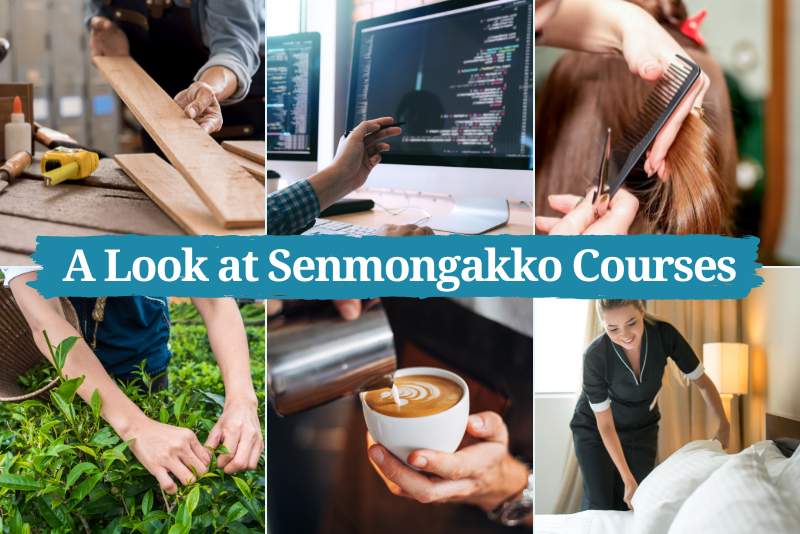
Entry Requirements to Senmongakko by the Japan Student Services Organisation (JASSO)
Actual admission requirements may vary slightly for each senmongakko, but the general requirements for admission introduced by JASSO are as follows :
Japanese language proficiency for admission to a senmongakko
① Those who have received at least 6 months Japanese language education at a Japanese language educational institution designated by an official notice from the Ministry of Justice.
② Those who have passed N1 or N2 of the Japanese Language Proficiency Test (JLPT) conducted by the Japan Educational Exchanges and Services Assoc. (JEES) and the Japan Foundation.
③ Those who have received more than 1 year education at an elementary school, junior high school, or high school in Japan.
④ Those who have obtained a score of 200 or more for Japanese as a Foreign Language (Reading and Listening Comprehension total score) in the Examination for Japanese University Admission for International Students (EJU).
⑤ Those who have acquired 400 points or more in the Business Japanese Proficiency Test (BJT) conducted by the Japan Kanji Aptitude Testing Foundation (日本漢字能力検定協会).
Educational background and age requirements for admission to a senmongakko
① Those who have completed 12 years of schooling outside Japan.
② Those who have reached 18 years of age, and passed an academic qualification exam equivalent to 12 years of schooling outside Japan.
③ Those who have reached 18 years of age, and have completed international school in Japan equivalent to high school education outside Japan.
④ Those who have completed 11 years of education outside Japan in a course designated by MEXT.
⑤ Those who have reached 18 years of age, and hold an International Baccalaureate, German Abitur or French Baccalauréat diploma, or achieve the necessary results to meet the GCE A-Level course requirements specified by their respective education institutions.
⑥ Those who have reached 18 years of age, and completed 12 years of education at an international school in Japan that is accredited by an international accreditation body.
⑦ Those who have reached 18 years of age, and passed the Upper Secondary School Equivalency Examination (高等学校卒業程度認定試験).
⑧ Those who have reached 18 years of age, and recognized by the educational institution they apply to as having academic abilities equivalent to or higher than a high school graduate (based on their entrance exam).
⑨ Those who satisfy any of the admission qualifications, other than specified above, in the School Education Act (学校教育法).
*In the case of ①~③ above, if period of completed education is below 12 years, completion of a recognized university preparatory course (準備教育課程), or curriculum at a training facility (研修施設) is required.
※ Study in Japan, “専修学校(専門課程) (English)”
Senmongakko entrance exam, AO entrance exam
To be admitted to a vocational school, in addition to satisfying the Japanese language proficiency, academic background and age requirements outlined above, each school will have an entrance exam that may be available in various forms (document screening, academic background screening, interview, essay writing, aptitude test, practical test, Japanese language proficiency test). etc). Get to know the details of entrance exams for schools you are interested in and prepare for them early.
※ Study in Japan, “専修学校(専門課程) (English)”
In addition, some vocational schools conduct the AO entrance examination (AO入試), a type of entrance examination for universities. The examination evaluates examiness based on high school grades, short essays, and interviews as compared to a typical university entrance exam. AO entrance exams at vocational schools are usually held sometime in June~December with differing schedules and entrance exam content for each school, so be sure to check the details in davance.
Criteria for Selecting a Senmongakko introduced by the Japan Student Services Organisation (JASSO)

There are many types of Japanese vocational schools offering different majors. On what basis should I choose a school? JASSO recommends checking the following six criteria. This is quite basic information, but please have a look.
6 Points for Choosing a Senmongakko
① Officially Accredited School: Is the school authorised by a prefectural governor that has jurisdiction? If unauthorised or unlicensed, you cannot be awarded your diploma title.
② Curriculum & Teachers: What is the curriculum? What about the ratio of number of students to teachers?
③ Facilities & Equipment: Do they have adequate facilities & equipment for learning? Confirm by checking photos and school pamphlets.
④ Employment Guidance & Graduates Career Guidance: What is the school’s employment guidance policy? What are the graduates' employment prospects, where do they work?
⑤ School Tuition: First year cost? Total amount until graduation? When is payment due?
⑥ School Reputation: Let's check on the graduates and international students network.
※ Study in Japan, “専修学校(専門課程) (English)”
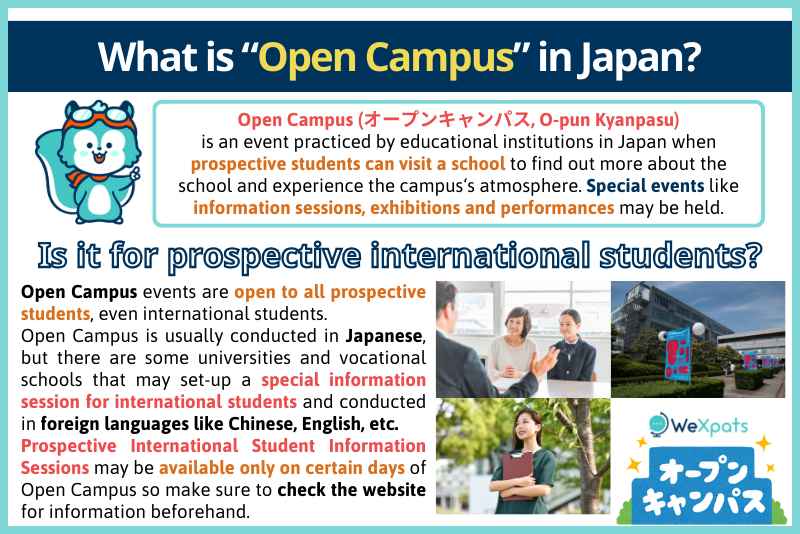
“Open Campus (オープンキャンパス)” to scout the school’s curriculum and facilities
In Japan, for a set amount of days and time, potential students can visit universities, colleges, vocational schools, etc. educational institutions to visit the campus and attend an information session to learn more about the school. This event is called “open campus (オープンキャンパス)”, and the same concept as “open days” in United Kingdom universities.
It is a great opportunity to find out all you can about the school so don’t miss out on it. Admission applications should be submitted from between summer vacation to winter (December~February) of the previous year you plan to enrol in school. Different schools have different admission schedules and plans, so it would be a good idea to check out your interested school’s open campus dates and prepare accordingly.
Prioritising an education that can get you a job? Senmongakko’s “Applied Professional Postsecondary Course (職業実践専門課程)”
If you are particularly concerned about the vocational curriculum at a vocational school, you may want to refer to the “Applied Professional Postsecondary Courses (職業実践専門課程)” recognized and recommended by MEXT for maintaining the education quality of vocational schools. Schools that have close relations with companies, curriculum that reflects the latest practical knowledge and abilities that the companies want, and the opportunity to experience practical training are some of the advantages of these courses. Check the link below for a list of the vocational schools and the relevant courses.
※ MEXT, “(別添2)令和元年度職業実践専門課程認定一覧” [PDF]
Finding a Job in Japan with Senmongakko: Career Path after Graduation, Employment Rate
It is a fact that many people choose to attend a senmongakko because of work, and so they are especially interested in their career paths after graduation and the employment rate.
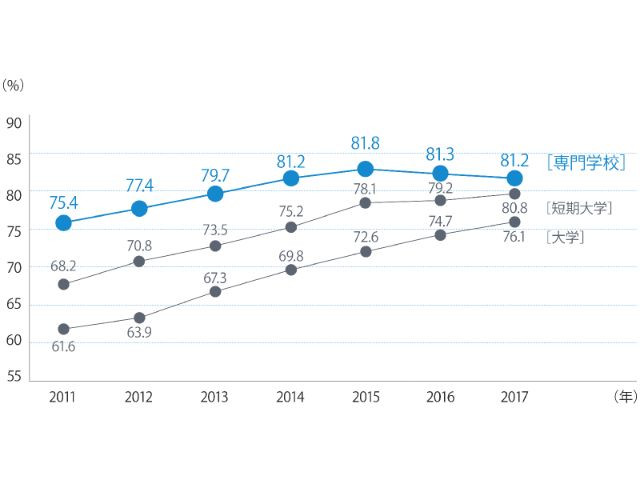
Image Credit: Association for Technical and Career Education
According to the Association for Technical and Career Education, vocational schools’ employment rates (proportion of those employed among graduates) was 81.2% in 2017, which is higher than junior colleges (80.8%) and universities (76.1%).
※ Association for Technical and Career Education, “Advantages of Professional Training Colleges”
In a senmongakko, knowledge in a specialised field is taught to students, as well as the necessary skills and information to work a real job. Furthermore, the school’s graduate employment rate is greatly emphasised at open campus events, which shows how important a criterion it is for potential students when it comes to selecting a school. On the school’s side, they endeavour to help students gain employment. One of the strengths of a Japanese vocational school is that they make timely preparations for students to gain the necessary qualifications for their relevant field. From an early stage, many companies in relevant fields will hold job information sessions in collaboration with the school, giving students the opportunity to job hunt and investigate their career path.
[Note] Senmongakko and Courses according to Career Paths
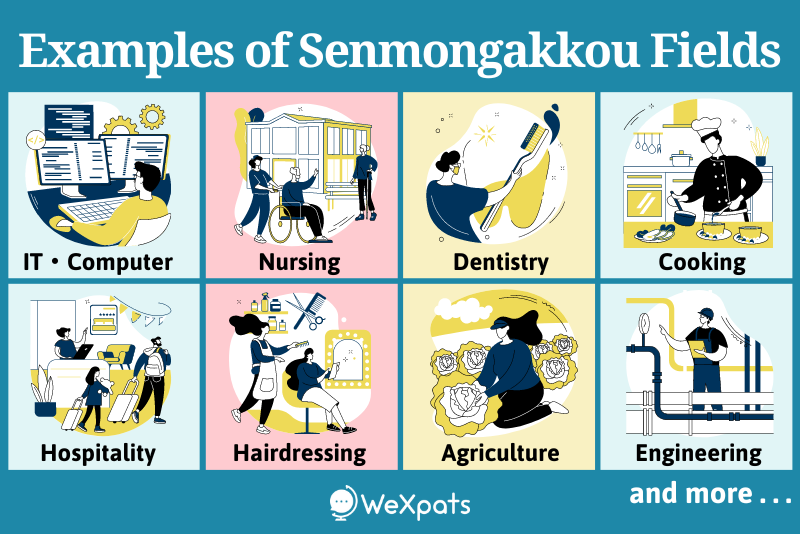
Vocational schools have many courses and subjects, from well-known courses to unique ones that you might say, “I can study this?” Search for schools by looking up「分野 bunya (field)+専門学校 senmongakko」, but keep in mind that the field name may not be included in the school name.
Vocational School Fields examples
- Computer・Game
- Architecture・Civil Engineering・Electrical・Automobile・Aviation
- Agriculture・Marine Science・Environment
- Nursing
- Medicine・Rehabilitation・Radiation
- Dentistry
- Medical Office・Drugs
- Hairdressing・Beauty・Fashion
- Cooking・Confectionary
- Childcare
- Social Welfare
- Tourism・Hotel・Language・Airline
- Public Servant・Business
- Music・Broadcast・Design
- Sports・Animals
Japanese Vocational/Technical School Search Sites
(introduced by JASSO in “Professional Training Colleges”)
- National Association of Vocational School of Japan: introduces vocational schools across Japan by region
- Metropolitan Tokyo Professional Institution Association: introduces vocational schools in Tokyo
- Association for Technical and Career Education: list of vocational schools that accept international students
- National Information Centre for Academic Recognition Japan (NIC-Japan): search for higher education institutions in Japan
IT
“Engineering (工学 kougaku)” or “Electronic (電子 denshi)” are sometimes included in the school’s name. For example, Nihon Kogakuin College (日本工学院専門学校), and Japan Electronics College (日本電子専門学校).
Fashion (ファション)
“Clothes (服装 fukusou)” is sometimes used in school names, such as Bunka Fashion College (文化服装学院). “Mode (モード)” like Tokyo Mode Gakuen (東京モード学園) is also used.
Design (デザイン)
In some cases, “design” is not included in the name of the school, such as Tokyo Communication Arts Training School (東京コミュニケーションアート専門学校). Amongst this school’s communication majors, there is also a major for “Dog Trainer”.
Broadcast (放送) & Audio (音響)
Toho Gakuen (東方学園) has courses in the fields of television, radio, film, lighting, art, voice acting, animation, as well as fields in movies and audio.
Game (ゲーム), Animation (アニメーション)
Most of the courses in Tokyo College of Anime and E-Sports (東京アニメ・声優&eスポーツ専門学校) are for 3-4 years. In the case of the “Game App & VR Creator” major, you can receive an advanced-diploma in a 4 year programme.
At Yoyogi Animation Academy (代々木アニメーション学院), in addition to the animation and game departments, they have also established a manga department.
Hotel (ホテル)・ Tourism (観光)
In the field of tourism and hospitality, there are of course vocationals schools such as Nakamura International Hotel School (中村国際ホテル専門学校), but there’s also national university Wakayama University (和歌山大学), private university Ritsumeikan Asia Pacific University (立命館アジア太平洋大学; APU), and many other vocational schools and universities.
Foreign Language (外国語)
International students have a high employment rate in the fields of translation (翻訳) and interpretation (通訳). You can find relevant courses at「外語専門学校」, foreign language vocational schools.
Food (料理)・Cooking (調理)・Confectionary Production (製菓)
Some students who want to enter a culinary vocational school may be worried whether they’ll have trouble getting a visa to work in Japan after graduation because of Japan immigration regulations.
Previously, international students who learnt Japanese cuisine at a culinary training school (accredited institution) could only be granted a status of residence up to 5 years after graduation if they work in a Japanese restaurant. However, in 2019, the scope of this regulation was enlarged. As a result, not only international students who learnt Japanese cuisine, graduates of chef training facilities, confectioners, and hygienists have also become eligible. Aside from Japanese restaurants, eligible workplaces for granting status of residence (up to 5 years) were expanded to include general eateries, confectionary stores, bakeries, hotels, and ryokan.
However, since it is considered a form of “work training (就労研修)”, your workplace must have an environment conducive to your training with a training plan, have a sound and stable business, and adheres to labour laws and regulations. The type of status of residence that can be obtained at this time is “designated activities”, and the relevant designated activity is “Foreign Chef・Foreign Confectioner/Hygienist (外国人料理人・外国人製菓衛生士)”.
※ Ministry of Agriculture, Forestry and Fisheries, “日本料理海外普及人材育成事業の一部改正について” (2019.11.1)
Find a Job in Japan with WeXpats
After graduating from a Vocational School in Japan, the next step is to find a job in Japan. Let WeXpats help you!
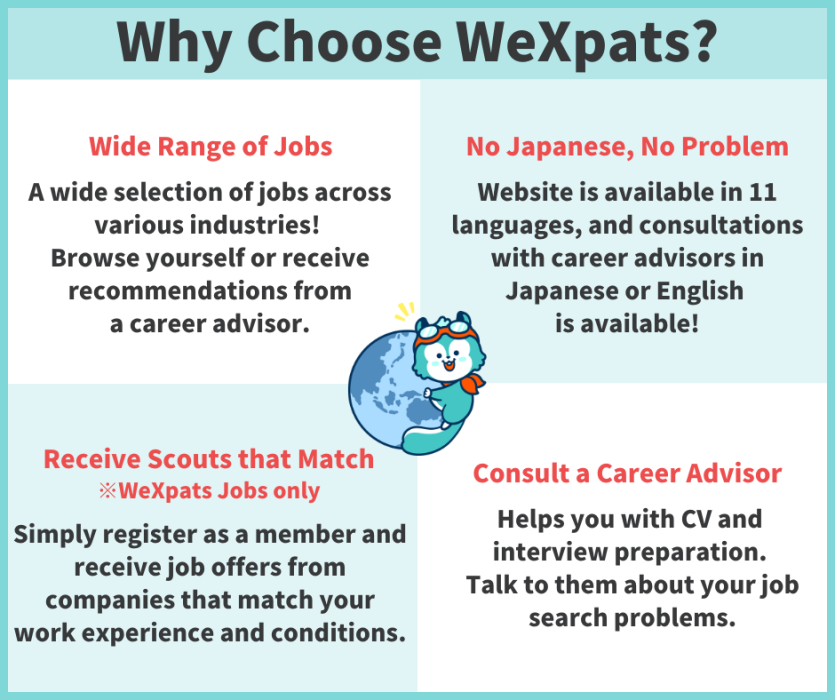
WeXpats operates a service for foreign nationals who want to work in Japan. There are jobs in a variety of industries. There are 2 services available on WeXpats - WeXpats Agent for full time jobs and WeXpats Jobs for part time jobs.
Looking for a Full Time Position? Leave it to WeXpats Agent!
WeXpats Agent is a career support service that specialises in employment for foreign nationals living in Japan.
Recruitment agencies in Japan are a service where dedicated career advisors will assist you with your job hunt for free. In addition to introducing open positions, we also provide support to help you create your Japanese resume and practice for interviews. Worried about job hunting in Japanese? We are here for you.
Features of WeXpats Agent
-
We have many job openings that are a good fit for foreign nationals to work in, such as translation, interpretation, inbound, etc. jobs that make use of your language skills, as well as engineering etc. jobs that do not require Japanese skills.
-
Our career advisors support and help you prepare your resume and practice job interviews with you. Clearly communicate your strengths to the hiring company.
-
We will handle communication with companies on your behalf, such as arranging interview dates and negotiating conditions. And thereby reducing your stress and time spent.
Finding a Part Time Job? Browse on WeXpats Jobs!
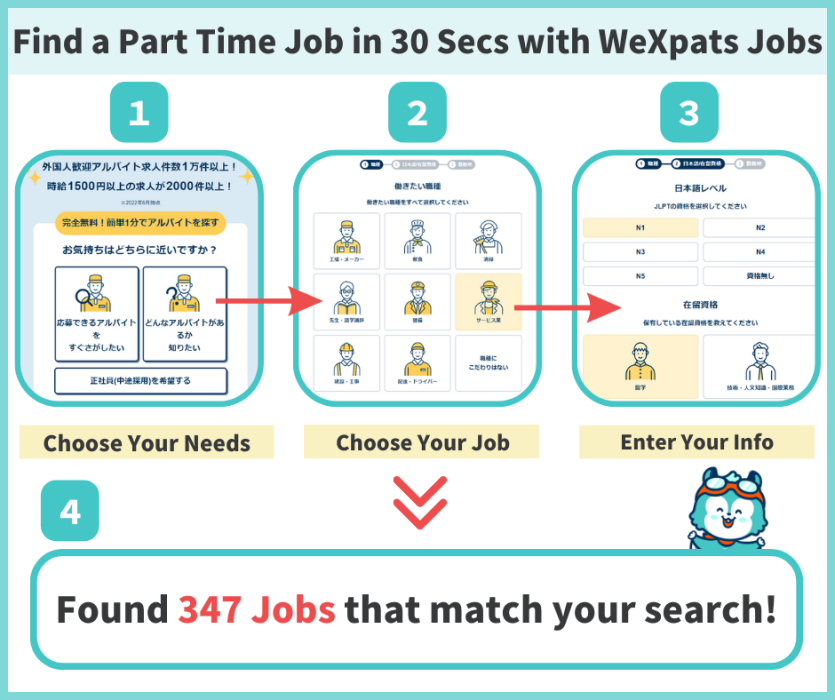
WeXpats Jobs is a part time job site for foreign nationals living in Japan. You can search for jobs in 11 languages (English, Vietnamese, Korean, Indonesian, Traditional Chinese, Simplified Chinese, Burmese, Thai, Spanish, Portuguese), including Japanese. Find jobs that suit you by specifying your Japanese language level, occupation, location, and etc.
※ You can register from outside Japan, but only those living in Japan can apply for jobs.
Find a Specific Skills Job in Japan with LGS
Many vocational schools specialise in specific skills jobs which require a Specified Skilled Worker (SWS) Visa to stay in Japan.

Leverages Global Support is a career support service that introduces jobs that require specific skills to specified skilled workers.
We also help with all the procedures required for employment and job changes, such as change of status of residence (visa type) and interview practice. If you have any problems after starting work, please feel free to contact us as well.
If you would like to know more about specified skilled workers and specific skills, please read this article, or contact a career advisor.
Recommended For
- Specified Skilled Workers who are thinking about changing jobs
- Technical Interns who want to switch to becoming a Specified Skilled Worker (You can try working in a new industry even with no experience!)
- International Students who have graduated from a Japanese school but are having trouble finding a job
How to Use Leverages Global Support
Ask for Job Recommendations
A career advisor will support you with your job search based on your desires. If you would like to be introduced to a specific skill job, feel free to send us a message using the link below.
Mention “WeXpatsを見た” at the beginning of your message, and our staff will respond promptly.
※ A Facebook account is required. Responses will be in Japanese.
Browse Jobs Yourself
You can search for the perfect job by specifying your Japanese level, occupation, work location, etc. We have many jobs available not only for Specified Skilled Workers, but also for Engineer / Specialist in Humanities / International Services.
※ You can register from outside Japan, but only those living in Japan can apply for jobs.
































